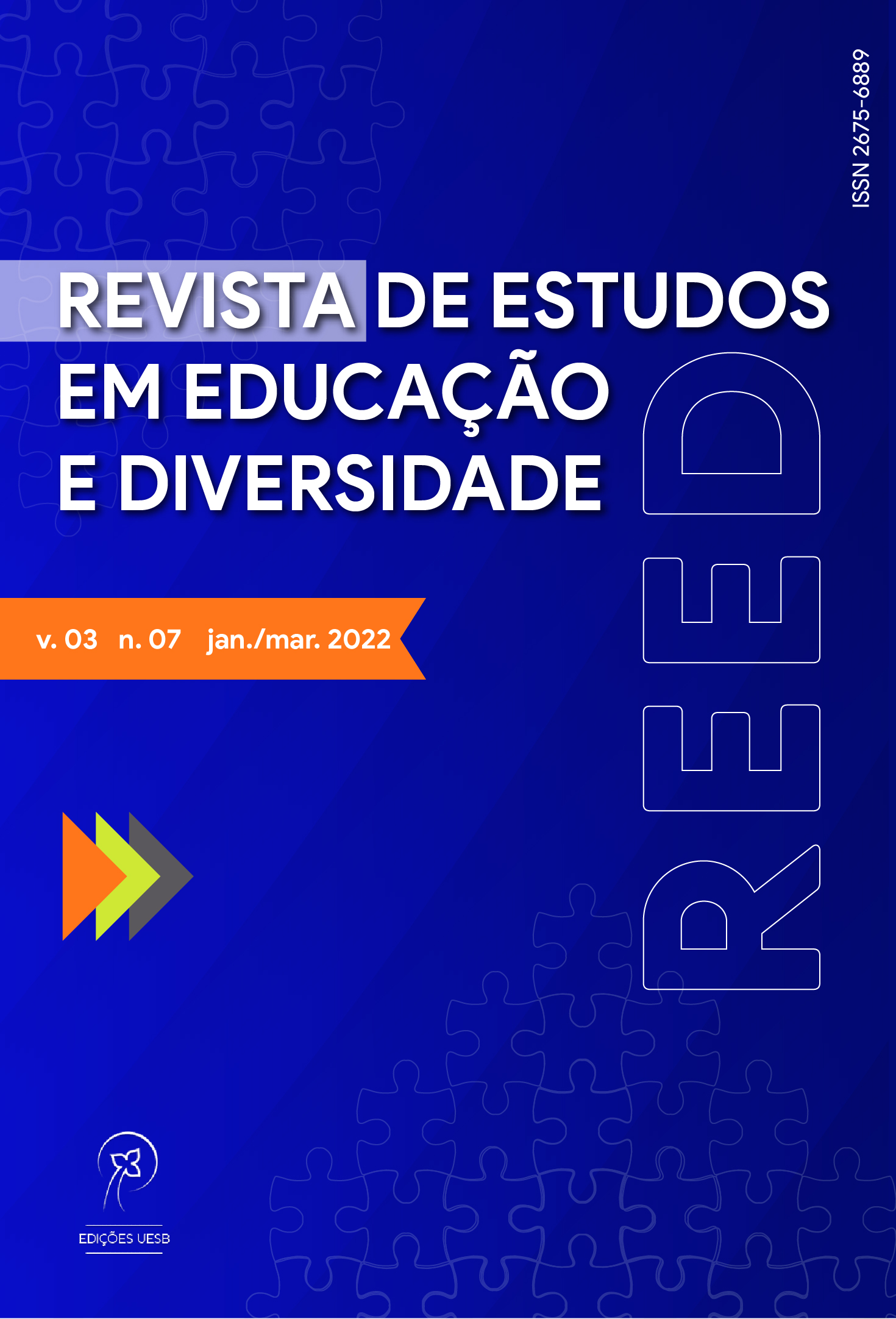PEDAGOGIES OF FAVELAS: POPULAR EDUCATION, EMANCIPATION AND DECOLONIZATION
DOI:
https://doi.org/10.22481/reed.v3i7.10289Keywords:
Diversity, Favela pedagogies, Urban OutskirtsAbstract
Favelas are territories historically marked by the denial of rights, but they are also locus of rich sociocultural diversity. In these contexts, schools have the transformative potential of contributing to the construction of more equitable societies. Thus, when questioning which elements should make up the curricular practices committed to social transformation in favela communities, this paper aims to present a pedagogical perspective with an emancipatory and decolonizing bias critically centered on the cultural, identity, historical and epistemological constructions of communities of slums. For that, starting from bibliographic analysis and presenting results of monographic research carried out with public school students and teachers, some relevant sociocultural elements are discussed to be included in educational pedagogical practices. As a result, the article identifies elements necessary for the construction of emancipatory and decolonizing pedagogical perspectives, committed to social transformation based on the culture of the people in the favelas, recognizing their potential and contradictions from the horizontal dialogue with the local community and social movements representing the popular longings.
Downloads
References
AROUCA, M. de J. Favelas Pedagógicas: distanciamentos e aproximações entre a cultura escolar e a cultura da (o) educanda (o) de favela. 2017. 78 f. Trabalho de conclusão de curso (Graduação) – Pedagogia, Universidade do Estado da Bahia, Bahia. 2017.
AROUCA, M. de J.; RIBEIRO, A. C. L. Pedagogias Favelares: Educação em Direitos Humanos e a Lei 10.639/03. In: BOMFIM, N. R.; MEIRELES, E.; SANTANA, L. A. A. (Org.). Representações, educação e interdisciplinaridade: abordagens teórico-práticas na interface entre diversidade e direitos humanos. Cruz das Almas: UFRB, 2019, p. 17–25.
AROUCA, M. de J.; BOMFIM, N. R.; ARAUJO, J. S. de; RIBEIRO, A. C. L. Emancipação e descolonização da educação na favela. In: SANTOS, K. da S.; NUNES, E. J. F.; SANTOS, P. J. P. (Org.). Educação na contemporaneidade: globalização, novas aprendizagens e emancipação. Curitiba: Editora CRV. 2019, p. 167 – 182.
ARROYO, M. G. Outros sujeitos, outras pedagogias. Petrópolis: Vozes, 2012.
BRANDÃO, C. R.; FAGUNDES, M. C. V. Cultura popular e educação popular: expressões da proposta freireana para um sistema de educação. Educar em Revista, Curitiba, n. 61, p. 89-106, jul/set., 2016. Disponível em: https://www.scielo.br/j/er/a/KmYHVqgFMPBfJTjXsRjFFvc/abstract/?lang=pt. Acesso em: 16 dez. 2016.
DUSSEL, E. Transmodernidade e interculturalidade: interpretação a partir da filosofia da libertação. Revista Sociedade e Estado, v. 31, n. 1, p. 51-73 jan./abr. 2016. Disponível em: https://www.scielo.br/j/se/a/wcP4VWBVw6QNbvq8TngggQk/?lang=pt. Acesso em: 16 dez. 2016.
FREIRE, P. Pedagogia do Oprimido. 57. ed. Rio de Janeiro: Paz e Terra, 2014.
GADOTTI, M. Educação popular, educação social, educação comunitária: conceitos e práticas diversas, cimentadas por uma causa comum. Revista Diálogos: pesquisa em extensão universitária, IV Congresso Internacional de Pedagogia Social: domínio epistemológico. Brasília, v. 18, nº 1, dez. 2012, p. 10-32. Disponível em: https://portalrevistas.ucb.br/index.php/RDL/article/view/3909/2386 Acesso em: 13 dez. 2021.
GOHN, M. G. Movimentos Sociais na Contemporaneidade. Revista Brasileira de Educação. v. 16, n. 47, p. 333-361, maio-ago. 2011. Disponível em: https://www.scielo.br/j/rbedu/a/vXJKXcs7cybL3YNbDCkCRVp/abstract/?lang=pt Acesso em: 12 dez. 2018.
GOMES, N. L. O Movimento Negro Educador: saberes construídos nas lutas por emancipação. Petrópolis: Vozes, 2017.
HALL, S. A questão multicultural. In: HALL, S.; SOVIK, L. Da Diáspora: identidades e mediações culturais. Belo Horizonte: Editora UFMG, 2003, p. 49-94.
IBGE. Censo demográfico 2010: Aglomerados subnormais: informações territoriais. Rio de Janeiro, 2013. Disponível em: http://biblioteca.ibge.gov.br/visualizacao/periodicos/552/cd_2010_agsn_if.pdf. Acesso em: 12 dez. 2018.
MIGNOLO, W. D. Desobediência epistêmica: a opção descolonial e o significado de identidade em política. Cadernos de Letras da UFF, Rio de Janeiro, n. 34, p. 287-324, 2008. Disponível em: http://professor.ufop.br/sites/default/files/tatiana/files/desobediencia_epistemica_mignolo.pdf. Acesso em: 02 jan. 2020.
QUIJANO, A. Colonialidade do poder, Eurocentrismo e América Latina. In: LANDER, E (Org.). A colonialidade do saber: eurocentrismo e ciências sociais. Perspectivas latino-americanas. Buenos Aires: CLACSO, 2005. p. 107-130. Disponível em: http://biblioteca.clacso.edu.ar/clacso/sur-sur/20100624103322/12_Quijano.pdf. Acesso em: 12 dez. 2018.
SILVA, G. ReFavela (notas sobre a definição de favela). Lugar Comum: estudos de
mídia, cultura e democracia, n. 39, p. 37–43, 2013. Disponível em: https://revistas.ufrj.br/index.php/lc/article/view/50827/27570. Acesso em: 12 dez. 2018.
SILVA, J. de S.; BARBOSA, J. L.; BITETI, M. de O.; FERNANDES, F. L. (Org). O que é favela, afinal? Rio de Janeiro: Observatório de Favelas, 2009.
SOUZA, Â. G. Favelas, invasões e ocupações coletivas nas grandes cidades brasileiras – (Re). Qualificando a questão para Salvador- BA. Cadernos Metrópole, n. 05, p. 63-89, 2001. Disponível em: https://revistas.pucsp.br/metropole/article/view/9297. Acesso em: 02 jan. 2020.
WALSH, C. Interculturalidade Crítica e Pedagogia Decolonial: in-surgir, re-existir e re-viver. In: CANDAU, V. M. (Org). Educação Intercultural na América Latina: entre concepções, tensões e propostas. Rio de Janeiro: 7 letras. p. 12-42, 2009.
Downloads
Published
How to Cite
Issue
Section
License
Copyright (c) 2022 Revista de Estudos em Educação e Diversidade - REED

This work is licensed under a Creative Commons Attribution 4.0 International License.
You are free to:
Share - copy and redistribute the material in any medium or format; Adapt - remix, transform, and build from the material for any purpose, even commercially. This license is acceptable for Free Cultural Works. The licensor cannot revoke these freedoms as long as you follow the terms of the license.
Under the following terms:
Attribution - You must appropriately give credit, provide a link to the license, and indicate if any changes have been made. You may do so in any reasonable way, but not in a way that suggests that you or your use is endorsed by the licensor.
There are no additional restrictions - You cannot apply legal terms or technological measures that legally restrict others to make any use permitted by the license.






